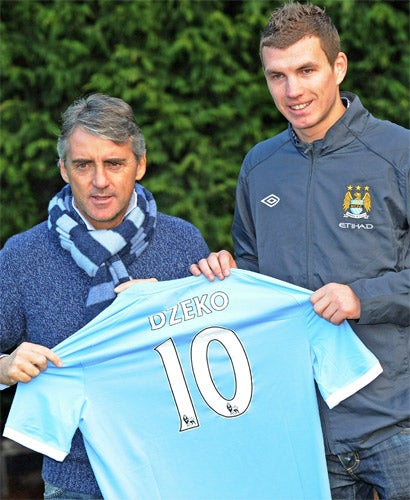City have cause for optimism in big leap up money league

Your support helps us to tell the story
From reproductive rights to climate change to Big Tech, The Independent is on the ground when the story is developing. Whether it's investigating the financials of Elon Musk's pro-Trump PAC or producing our latest documentary, 'The A Word', which shines a light on the American women fighting for reproductive rights, we know how important it is to parse out the facts from the messaging.
At such a critical moment in US history, we need reporters on the ground. Your donation allows us to keep sending journalists to speak to both sides of the story.
The Independent is trusted by Americans across the entire political spectrum. And unlike many other quality news outlets, we choose not to lock Americans out of our reporting and analysis with paywalls. We believe quality journalism should be available to everyone, paid for by those who can afford it.
Your support makes all the difference.Manchester City have leapt to a position just outside the world's top 10 revenue-earning clubs, in what the club will hope is a sign of its ability to drive down its losses to comply with Uefa's Financial Fair Play (FFP) regulations. City's failure to qualify for the Champions League has not prevented them leaping from 20th to 11th in the Deloitte Football Money League, which examines the 20 biggest earners.
For the sixth consecutive year, Real Madrid claimed top spot as the world's largest football club according to this measure. Real are now just two years short of matching third-placed Manchester United's eight year reign at the top from 1996-97, though Deloitte believes that the Barcelona's new shirt sponsorship deal with the Qatar Sports Investment Agency may see them surpass Real in next year's table.
Deloitte's study, which shows the 20 top earners exceeding €4bn (£3.4bn) for the first time, demonstrates the overwhelming potential of increased stadium size to drive clubs up. Though Tottenham Hotspur have moved up three places to 12th after posting record £119.8m revenues in the 2009-10 season under analysis, the study illustrates the constraints of the White Hart Lane stadium capacity – 36,240 – which delivers income per game of "only" £1.5m. Success in the bid to occupy the 60,000-capacity Olympic Stadium would surely put Spurs among the top 10 clubs.
An increase in stadium capacity from the current 47,726 is also something City aspire to, but will not embark on until their analysis demonstrates they could fill such capacity. But a serious increase in revenues is badly needed for a club whose £121m wage bill resulted in it losing £133m in the 12 months to May 2010 – 10 times the figure Uefa is willing to tolerate in 2013, the first year of FFP.
The Money League delivers positive signs of the potential, with match-day revenues up by 17 per cent (£3.6m) despite the lack of European football. A 6 per cent increase in match-day attendances and 12 per cent increase in broadcasting revenue have alsos contributed to making City the biggest climbers this year.
As Deloitte observes, on-field success to match heavy investment in players is key to City piercing the top 10, though the club believe that stadium naming rights, development of the land surrounding the stadium – 80 acres of land have been acquired in nearby Openshaw West – and making the stadium pay its way on non-match days can help build revenues to offset wage costs.
United's growth remains undimmed, despite a less successful season on the pitch in 2009-10. The club's own revenues grew by £7.9m (3 per cent), with a £8.2m decrease in match day revenue more than offset by growth in broadcasting and commercial revenues. Earlier European and FA Cup elimination meant two fewer games in the season but new corporate sponsors took United's commercial activities up by £11.4m (16 per cent) to £81.4m. City's revenues are still less than half those of United, though given that they were less than a third in 2008-09 there is progress.
Aston Villa return to the top 20 after a five-year absence following Wembley appearances in both domestic cup competitions in 2009-10. Arsenal and Chelsea retained their previous fifth and sixth positions. Liverpool slipped one place to eighth.
On the potential implications of FFP, Paul Rawnsley, the director of Deloitte's Sports Business Group, said: "Outside exceptional circumstances, such as investment in stadia or the arrival of new owners, FFP will require football clubs to balance their books, ensuring expenditure does not significantly exceed revenue over time. Therefore, the strong showing of English clubs in the Money League provides encouragement about the future competitive health of English football."
The rich list
Revenue figures taken from 2009-10 (previous season's positions in brackets):
1. (1) Real Madrid £438.6m
2. (2) Barcelona £398.1m
3. (3) Manchester United £349.8m
4. (4) Bayern Munich £323.0m
5. (5) Arsenal £274.1m
6. (6) Chelsea £255.9m
7. (10) Milan £235.8m
8. (7) Liverpool £225.3m
9. (9) Internazionale £224.8m
10. (8) Juventus £205.0m
11. (20) Manchester City £152.8m
12. (15) Tottenham Hotspur £146.3m
13. (11) Hamburg £146.2m
14. (13) Lyons £146.1m
15. (14) Marseilles £141.1m
16. (16) Schalke 04 £139.8m
17. (18) Atletico Madrid £124.5m
18. (12) Roma £122.7m
19. (n/a) Stuttgart £114.8m
20. (n/a) Aston Villa £109.4m
Join our commenting forum
Join thought-provoking conversations, follow other Independent readers and see their replies
Comments